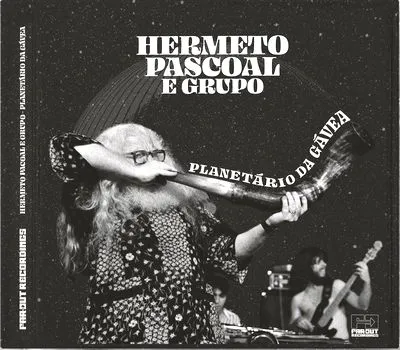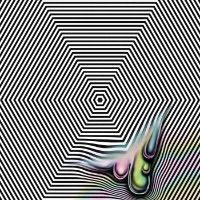- 2CD
- 2LP
- Recommended
- Back In
Hermeto Pascoal
Planetario da Gavea
Far Out Recordings
- Cat No: FARO229DCD
- updated:2024-04-24
こちらはCD。凄すぎる。。"Tudo e Som"(すべては音である)。楽聖エルメート・パスコアルによるプラネタリウムでのライブ音源!1981年リオ・デ・ジャネイロにて。
On a balmy Brazilian night in February, 1981, a crowd gathered in Rio de Janeiro's Gávea neighbourhood under the iconic dome of the city's Planetário (Planetarium). Alongside musicians like Helio Delmiro and Milton Nascimento (who were in the audience that night), they were there to see the great "Bruxo" (sorcerer) Hermeto Pascoal live in concert, with his new band formation which would become known simply as "O Grupo" (The Group).
Growing up on a farm in Brazil's northeastern state of Alagoas, Hermeto has always been deeply in tune with, and inspired by nature. In his youth he would make his own flutes to play call and response with the birds and frogs. He would build scrap-metal instruments in his blacksmith grandfather's forge, and sit for hours by the lake listening to the sounds of nature. On the Planetário Da Gávea recordings though, Hermeto is cast as the "sorcerer" or the "cosmic emissary" (as the great Brazilian guitarist Guinga once called him), exhibiting an intuitive sense of harmony and melody beyond that of our own world.
"Tudo e Som" (All is Sound). It's a phrase Hermeto regularly returns to, and it points to the fact that not only can music be made from anything, but also alludes to something much more profound. It's an understanding of the universe as being in a state of constant movement, forever vibrating at the quantum level, like the string of a guitar, or a saxophone's reed. "Tudo e Som" is a declaration of the mystical and spiritual power of sound, as a fundamentally vibrational force.
The series of concerts at the Planetário marked the birth of "O Grupo" which would last with the same line-up (apart from Zé Eduardo Nazário) for the next eleven years. Every member of O Grupo was a phenomenal musician in their own right. It was one of saxophonist/flautist Carlos Malta's first gigs with the group, and the concert unusually featured two drummers, Zé Eduardo Nazário and Marcio Bahia. Nazário, from São Paulo, had played with Hermeto during the mid-70s (as well as with Milton Nascimento, Egberto Gismonti and Toninho Horta, to name a few). Bahia though had just joined the group. Acclaimed keyboard player Jovino Santos Neto was on keyboards, piano and organ, and the great Itiberê Zwarg (who remains in Hermeto's band to this day), played bass. Rounding the group off was the percussionist Pernambuco. During this period (up until the early 90s) the group would rehearse for hours on end, virtually seven days a week, with a total dedication to music and Hermeto's musical vision.
Most of the compositions performed that night at the Planetário had never been recorded before, and many are unique to this album, including the wild 'Homônimo Sintróvio', the exaltant 'Samba Do Belaqua', 'Vou Pra Lá e Pra Cá' and 'Bombardino', which features Hermeto's wonderfully absurd call and response mouthpiece soliloquy. Then there's the stunning 7/4 Samba 'Jegue' which builds with inventive dissonance, before releasing yet another celestially colourful, celebratory refrain. The show also features the first recorded performances of 'Era Pra Ser e Não Foi' and 'Ilza na Feijoada' (inspired by Hermetos' wife Ilza's famed black bean and meat stew), which Hermeto later recorded on his 1984 studio album "Lagoa Da Canoa Município De Arapiraca".
Dubbed by Miles Davis as "one of the most important musicians on the planet", a Hermeto Pascoal live show was (and still is) an experience like no other. Across the recording of the Planetário concert, wild improvisation meets groovy, virtuosic vamping on progressive, extended psychedelic jams. The tracks are generally built around a beautiful, transcendent melody; instantly recognisable as being Hermeto's, and for the most part, the musicians then solo over extended two chord vamps. There's a plethora of powerfully delivered rhythms, wild solos and the performances are punctuated by Hermeto's unpredictable, at times comical sonic antics.
Over forty years since this historic happening, Far Out Recordings is overjoyed to release this magical recording of Hermeto Pascoal e Grupo Live at Planetário Da Gávea, on double vinyl LP, CD and digitally for a February 4th 2022 release.
All tracks composed by Hermeto Pascoal
Hermeto Pascoal - piano, baritone horn, tenor saxophone, flute, vocals
Carlos Malta - soprano saxophone, flute, piccolo
Zé Eduardo Nazario - drums, percussion
Marcio Bahia - drums, percussion
Itiberê Zwarg - acoustic and electric basses, piano
Jovino Santos Neto - piano, electric piano, clavinet, harmonium
Pernambuco - percussion
Recorded at Planetário da Gávea, Rio De Janeiro, February 1981
Original tape transfer by Gabriel M. Yazbeck
Additional tape restoration by Daniel Maunick
Mastered by Lelo Nazario at Utopia Studio and Pete Norman at Finyl Tweek
Project coordination by Joe Davis, Jake Williams and Josh Tautz
Art direction by Josh Tautz and Alessandro Renaldin
Artwork and Design by Alessandro Renaldin
Photograph: Hermeto Pascoal by Dany Gignoux, licensed by Centre d’iconographie, Bibliothèque de Genève
Growing up on a farm in Brazil's northeastern state of Alagoas, Hermeto has always been deeply in tune with, and inspired by nature. In his youth he would make his own flutes to play call and response with the birds and frogs. He would build scrap-metal instruments in his blacksmith grandfather's forge, and sit for hours by the lake listening to the sounds of nature. On the Planetário Da Gávea recordings though, Hermeto is cast as the "sorcerer" or the "cosmic emissary" (as the great Brazilian guitarist Guinga once called him), exhibiting an intuitive sense of harmony and melody beyond that of our own world.
"Tudo e Som" (All is Sound). It's a phrase Hermeto regularly returns to, and it points to the fact that not only can music be made from anything, but also alludes to something much more profound. It's an understanding of the universe as being in a state of constant movement, forever vibrating at the quantum level, like the string of a guitar, or a saxophone's reed. "Tudo e Som" is a declaration of the mystical and spiritual power of sound, as a fundamentally vibrational force.
The series of concerts at the Planetário marked the birth of "O Grupo" which would last with the same line-up (apart from Zé Eduardo Nazário) for the next eleven years. Every member of O Grupo was a phenomenal musician in their own right. It was one of saxophonist/flautist Carlos Malta's first gigs with the group, and the concert unusually featured two drummers, Zé Eduardo Nazário and Marcio Bahia. Nazário, from São Paulo, had played with Hermeto during the mid-70s (as well as with Milton Nascimento, Egberto Gismonti and Toninho Horta, to name a few). Bahia though had just joined the group. Acclaimed keyboard player Jovino Santos Neto was on keyboards, piano and organ, and the great Itiberê Zwarg (who remains in Hermeto's band to this day), played bass. Rounding the group off was the percussionist Pernambuco. During this period (up until the early 90s) the group would rehearse for hours on end, virtually seven days a week, with a total dedication to music and Hermeto's musical vision.
Most of the compositions performed that night at the Planetário had never been recorded before, and many are unique to this album, including the wild 'Homônimo Sintróvio', the exaltant 'Samba Do Belaqua', 'Vou Pra Lá e Pra Cá' and 'Bombardino', which features Hermeto's wonderfully absurd call and response mouthpiece soliloquy. Then there's the stunning 7/4 Samba 'Jegue' which builds with inventive dissonance, before releasing yet another celestially colourful, celebratory refrain. The show also features the first recorded performances of 'Era Pra Ser e Não Foi' and 'Ilza na Feijoada' (inspired by Hermetos' wife Ilza's famed black bean and meat stew), which Hermeto later recorded on his 1984 studio album "Lagoa Da Canoa Município De Arapiraca".
Dubbed by Miles Davis as "one of the most important musicians on the planet", a Hermeto Pascoal live show was (and still is) an experience like no other. Across the recording of the Planetário concert, wild improvisation meets groovy, virtuosic vamping on progressive, extended psychedelic jams. The tracks are generally built around a beautiful, transcendent melody; instantly recognisable as being Hermeto's, and for the most part, the musicians then solo over extended two chord vamps. There's a plethora of powerfully delivered rhythms, wild solos and the performances are punctuated by Hermeto's unpredictable, at times comical sonic antics.
Over forty years since this historic happening, Far Out Recordings is overjoyed to release this magical recording of Hermeto Pascoal e Grupo Live at Planetário Da Gávea, on double vinyl LP, CD and digitally for a February 4th 2022 release.
All tracks composed by Hermeto Pascoal
Hermeto Pascoal - piano, baritone horn, tenor saxophone, flute, vocals
Carlos Malta - soprano saxophone, flute, piccolo
Zé Eduardo Nazario - drums, percussion
Marcio Bahia - drums, percussion
Itiberê Zwarg - acoustic and electric basses, piano
Jovino Santos Neto - piano, electric piano, clavinet, harmonium
Pernambuco - percussion
Recorded at Planetário da Gávea, Rio De Janeiro, February 1981
Original tape transfer by Gabriel M. Yazbeck
Additional tape restoration by Daniel Maunick
Mastered by Lelo Nazario at Utopia Studio and Pete Norman at Finyl Tweek
Project coordination by Joe Davis, Jake Williams and Josh Tautz
Art direction by Josh Tautz and Alessandro Renaldin
Artwork and Design by Alessandro Renaldin
Photograph: Hermeto Pascoal by Dany Gignoux, licensed by Centre d’iconographie, Bibliothèque de Genève




自分で笛を作り奏で鳥やカエルとコール&レスポンスで遊び、祖父の鍛冶場で廃品利用した楽器を作り、湖畔に座って何時間も自然の音に耳を傾けていた少年時代。しかし今作のプラネタリオ・ダ・ガベアのレコーディングでは、エルメトは「魔術師」あるいは「宇宙の使者」(ブラジルの偉大なギタリスト、ギンガがかつてそう呼んだ)として、我々の世界を超えたハーモニーとメロディーの直感的センスを発揮。
これを機に11年不動のメンバーに固定されたという圧巻のグルーヴが誕生した夜(ミルトン・ナシメントも見にきていたとか)。もちろんそこにはサンバやブラジル東北部音楽といった様々なブラジリアン・フォークが内蔵されたエルメート節が炸裂。。やはり圧倒的と言わざるを得ない、、エルメート諸作は色々聴いてますが、この時代もあったであろう緊張感溢れるグルーヴにちょっと"怖さ"も感じてしまった、、なかなか凄いとこまできてます。2LPですが20枚分くらいの熱量、、30分以上のブラジリアン・サイケデリック・ジャム"Paz Amor e Esperança / Homônimo Sintróvio"(sample 1)、コール&レスポンスに驚"Bombardino"(sample 2)、美しいピアノからフルートまで流麗なジャム"São Jorge / Ilza na Feijoada"(sample 3)そこをとってもエルメート節。名門FAR OUTからのリリース、ジャケも最高すね。 (Shhhhh)